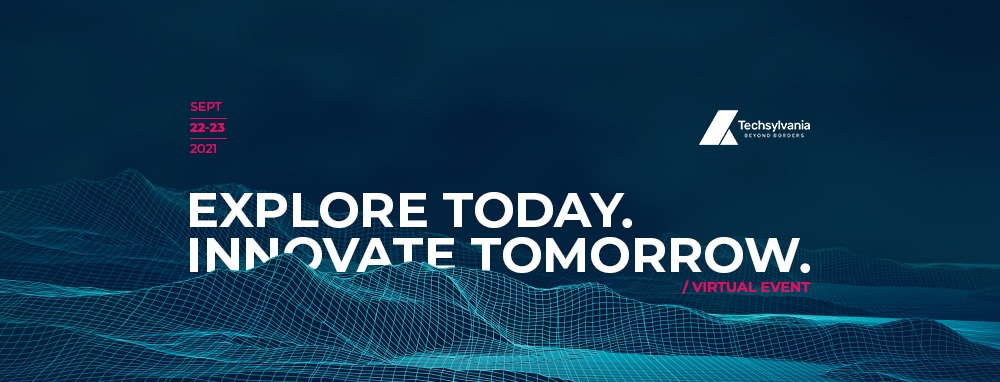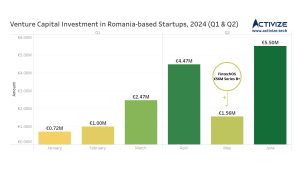Starting from this year’s motto, “Explore today. Innovate tomorrow.”, we can utterly agree that this edition of Techsylvania has created the space for its participants to not only learn technical and practical skills through the several workshops, but also find out some interesting life stories of successful entrepreneurs.
The event gave us the chance to explore engrossing topics, by which those who want to, have the possibility to feel empowered to take actions in order to create meaningful and innovative ideas. Furthermore, it can give us thought-provoking points, which guide our way in discovering the rich colors of the tech world.
One trend that we have seen throughout the conference is that even though the main topic was technology and innovation, somehow the speakers ended up emphasizing on people, making them the main driver of the industry and we could not agree more.
Innovation requires innovative people that put up the work and in this sense the key to today’s and tomorrow’s technology lies in the hands of our employees and in the needs of our customers. This is why building needs oriented products and team oriented organizational cultures is essential!
“One important idea that I learned at this conference was that the biggest industry disruptors have broken through the door of mediocrity without a great deal of experience, and this leads me to think that in some situations expertise can rather be the innovation’s enemy, than it’s friend.” says Andrea, one of our colleagues who joined the conference.
What we learned?
Powering Success by Fostering Community – Prashanth Chandrasekar (Stack Overflow)
Product-Market fit: delivering relatable value, measuring leading indicators.
Product-Market expansion: customer problem journey and use cases.
The go-to-market approach and the growth of the business can have multiple shapes; it can be product-led, sales-led or marketing-led.
There is a clear connection between our product, the brand and the community. While our product is about the best features or quality, reliability and distribution, the brand is about our values, the heritage and history, customer relations, quality and positioning. Having these things on point manages to create a shared identity with our customers. Moreover, building together with them, offering incentives and rewards for users creates a true community around our product.
Another important point in the development of our products is… the team! According to Prashanth, depending on the phase we find our business in we should have stage-specific teams, for example if we are in an early stage then our team shall be small, a tight knit group focused on product, architecture and engineering. While in a late stage the team is bigger with the ability to focus on market differentiation vs. market relevance, investments, on the voice of the customers while also having a go-to-market approach through a sales team.
Moving Fast at Scale – Randy Shoup (eBay)
What is the solution to moving fast at scale according to Randy from eBay? You have one guess! Moving fast at scale is about the culture, the organization and the practices!
More important than any other factor in the team’s success is the psychological safety – the team is safe for interpersonal risk-taking, there is no fear of negative consequences. Psychological safety leads to dependability, leading to structure and clarity, clear goals and roles which gives meaning to the people, making work important on a personal level, which in the end leads to impact.
Fewer things, more done? Do you agree? We were convinced by Randy that this is a great approach. Why? Priorities matter and we should focus on delivering the highest priority first, this makes us deliver full value earlier, since the benefit of now is more important than the benefit of the future.
In Conversation with Eric Friedman (Fitbit)
A short but very insightful discussion with Eric from Fitbit shed some light on how an ideal product fits the needs of the customer but furthermore constantly upgrades in order to respond to more and more of them. Fitbit started out as a fitness monitor for the average person, lending help in measuring different activities, the challenge was to constantly upgrade it; this led to introducing new features like the sleep monitor in order to break the market.
What does it mean to be an entrepreneur? According to Eric “part of being a founder means having the confidence that I can conquer the world but also understanding that maybe my hypothesis is wrong.”
Accepting this truth will lead to the ability to change and adapt the ideas on what the market actually requires. Another aspect that might be perceived as clicheic but that it very simple and true is that being an entrepreneur is doing it out of passions, having money and fame as a main motivation will lead to failure, these two should rather be perceived as nice outcomes while the main driver will always be the passion.
Find your focus – Zoltan Vardy (The Launch Code)
Zoltan Vardy from The Launch Code synthesized very accurately during his panel why focus matters, the nature of focus and how to find your focus as an entrepreneur. The focus creates a path, so it enables you to find the necessary steps to achieve that and to take decisions and moreover keeps you motivated.
Zoltan did not just emphasise the importance of focus but also provided us with four steps we need to follow in order to create a destination that reflects the business you want to build. First one would be to choose a point in time in the future when we want to reach that, then write a series of statements in the present tense, but keeping in mind to cover all key focus areas (qualities offered by the product, clients, team, strategic partnerships, rewards). Last but not least, don t forget to describe how you feel about that journey and outcome so you are aligned with it on an emotional level too.
You find your focus when you decide what business you want to make, that destination giving you a clear direction. Focus requires a commitment to execution so be firm in the long run, but flexible along the way so you could easily adapt. Let focus guide your mindset and actions!
Pro tip from Zoltan in order to keep your focus in mind is to create a snapshot of it and then place it where you see it everyday, share it with others and use it as an endpoint for all planning. However do not just stare at it but act on it. Choose your love, love your choice and just do it.
Remember to think big and your focus will eventually find you 🙂
Building Inclusive (UX) Team Culture by Melanie Yencken (Google)
Melanie Yencken from Google came to Techsylvania with a complete experience and sustainable actions on how to build an inclusive team culture.
Employees experience the company through their manager, so building team trust and respect is mandatory results in psychological safety. The best performing teams make the most mistakes, because they’re able to talk about them with honesty. When issues arise, it’s about the team, not the individual, and focus on learning.
Moreover, Melanie opened up regarding her experience at Google where she struggled dealing with impostor syndrome, perfectionism and fear of failure.
Most of the time, we tend to focus on being accepted vs. being ourselves. And how does this hold us back? We don’t want to seem ignorant, incompetent, intrusive, negative.
Psychological safety is team empathy and trust but also permission to fail.
She emphasises the importance of getting to know each other in the team at a professional level but also on a personal one. One nice exercise they implement is sharing personal baseball cards with type of personality, skills, when/where I work best, communication norms, feedback norms, strengths I am happy to share with others, my personal areas for growth, weekly must haves. Also reevaluating from time to time who we are outside of work and what we are gonna leave behind to be more present are also good practices as they maintain the focus.
Appreciation and compassion are a must so they run team exercises to express appreciation for something specific about a colleague or project. Acknowledging and appreciating each other shows compassion. Compassion towards others supports and promotes a culture of respect and inclusion.
Giving permission to fail helps reframe failures as learnings so they have ~tales of fail~ and share 5 minute stories of the key failures they want to celebrate – helping to humanize the concept of failing.
The Art of Growth – Lloyed Lobo (Boast.AI)
For this session Lloyed came with an easy to follow list of tips and tricks that he learned for assuring growth:
- Pick an aggressive goal.
- Understand your customers’ jobs to be done.
- Validate your idea by charging for it.
- Focus on 1-2 distribution channels at a time. It is known that in a marketing strategy we tend to approach things through many actions and channels at the same time (PR, search engine marketing, paid ads, offline marketing, email marketing, content marketing and many more). Lloyed believes that in order to grow one should focus on one channel in order to scale it. For instance pickinging from the entire list of strategies one that proved to be working for that specific business, concentrate on it in order to reach more people and jam more data.
- Once you acquire users, get them to an `Aha moment` right away. Community is yet again the keyword in this case, people need to have the opportunity to connect both between themselves and with the product, webinars, monthly dinners, conferences are ways in which we can achieve that. We need to get people to start a conversation.
- Make your product sticky. The more customers use the product, the better it should get or the more they lose if they were to leave.
Computational Intelligence and Artifacts from the Future – Stephen Wolfram (Wolfram Research)
The last session of Techsylvania was the one that blew away the audience. Stephen presented the way the Wolfram Language, a full-scale computational language integrates immense knowledge to allow a new level of computational description and automation. Only seeing the way this software can respond to certain queries and the enormous amount of information that it stores left people in awe.
This presentation raised really deep questions in the minds of those who participated: “Do we live in a simulation? If we get closer to representing everything around us using computational methods, does it make the simulation hypothesis more convincing?”.
Well to find the answer to this question and many more and to understand the greatness of technology and innovation… you just had to be there!
This is why you need to make sure to participate in all the sessions Techsylvania 2022 will offer. See you there next year!





